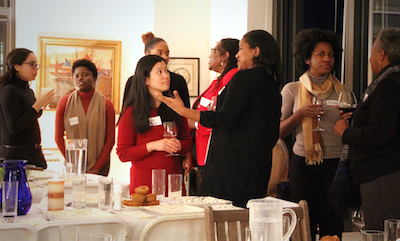‘I’m Happy to Have Found My Academic Family’.
 “I’m really happy to have found this space and to be welcomed,” said new MPH student Chrystel Murrieta at the Diversity Scholar Leadership Program (DSLP) dinner on December 9. “I’m happy to find my academic family.”
“I’m really happy to have found this space and to be welcomed,” said new MPH student Chrystel Murrieta at the Diversity Scholar Leadership Program (DSLP) dinner on December 9. “I’m happy to find my academic family.”
The dinner, hosted by program co-director and Professor of Community Health Sciences Judith Bernstein at her home, brought together 26 participants of the program—four new and six continuing scholars, their mentors, and alumnae of the program.
An initiative of the Center of Excellence in Maternal & Child Health, the scholarships support MPH students from underrepresented minority communities who are pursuing the Maternal & Child Health and/or the Sex, Sexuality & Gender certificates. Each diversity scholar receives 14 credits in scholarship, and is matched with a public health leader of color—many of them SPH alumni—as a mentor, as well as a faculty mentor.
Bernstein co-directs the program with Associate Professor of Community Health Sciences Lois McCloskey, director of the Center of Excellence and the lead on the program’s grant from the Maternal and Child Health Bureau of HRSA.
“We are able to give the scholars these resources so that, as a collective, they can build their leadership muscles as students of color while in graduate school,” McCloskey says. “They can build community and advocate for social justice with other allies, both within and beyond the walls of SPH.”
“It was so helpful to have a community,” said Porsha Eden, a continuing diversity scholar. Eden matriculated in January, making her DSLP cohort even more valuable as she settled into SPH, she said. “When you know you have community, resources, and faculty, you don’t feel isolated. You have a network in place.”
Mentors serve as role models for navigating the public health field as members of underrepresented minority communities, former scholar Hitomi Abe (’16) said during the dinner. Her mentor is “a smart, successful Asian American woman who is able to express herself, who can stand for herself,” said Abe, who now works for the Boston Public Health Commission. “I don’t think I was able to do that initially. That’s something that I needed from her.”
Mentors also bring perspective, and plenty of experience. “I grew up in the rural South in the 1960s,” said mentor Vivien Morris (’98), chairperson of the Mattapan Food and Fitness Coalition. “I had cross burnings across from my house. My neighbor’s windows were shot into when he ran for public office.
Referring to the current political climate, she said, “As bad as things are now, we can still turn this, but it’s going to be hard work.”
Bernstein said directing the program has been one of the most rewarding parts of her entire career. “It has been a community for me,” she said, “an opportunity to be close to the best young leaders, the brightest people that I’ve ever known in my life, and to really get to know them and support them.”
The best thing about the program, she said, is “watching people blossom into leadership and really change during this time that you spend with us in the program. It’s phenomenal to see that.”
McCloskey agreed. “We like nothing better as teachers than seeing people grow into these amazing jobs, making important contributions,” she said. Turning to the current diversity scholars, she said, “we can’t wait for when you get to be the mentors.”